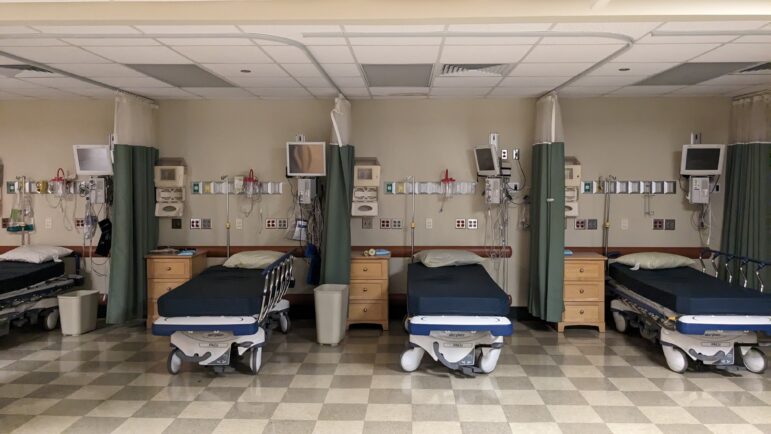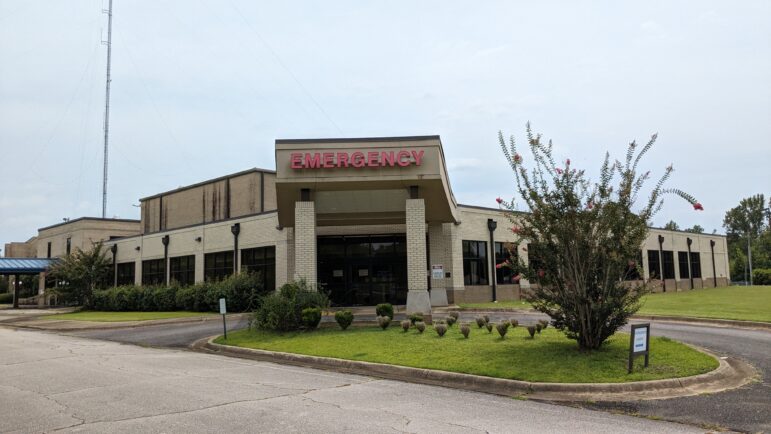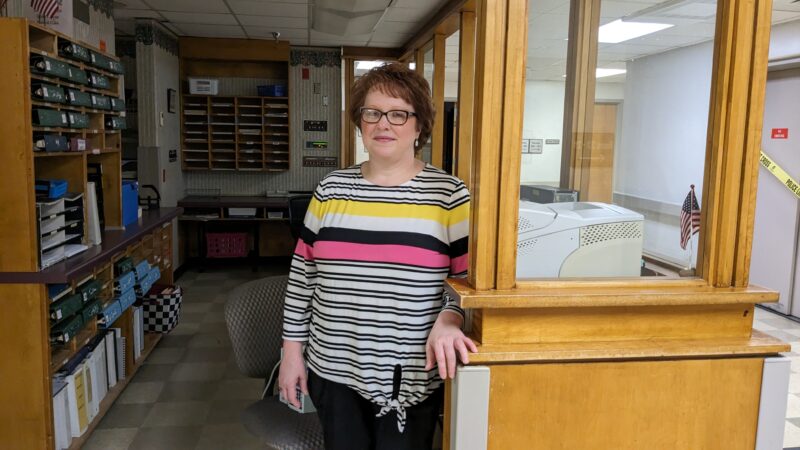What happens when a rural hospital shuts its doors? Look to Pickens County
Tabitha Pate stands in front of the nurses' station at the now-shuttered Pickens County Medical Center.
Tabitha Pate knows every corner of the Pickens County Medical Center.
She worked in the hospital’s human resources department for years. Now she stops by the facility almost every day to monitor for leaks and check the air handlers.
“We have tried to keep the facility maintained, with the hope that something will come to fruition,” Pate said.
For decades, Pickens County Medical Center offered inpatient and outpatient services, plus a 24-hour emergency department.
But facing low reimbursement rates and mounting debt, the hospital shut its doors in early 2020. Pate said it was a tragic loss for the community.
“To see the empty halls, to not hear the hustle and bustle of nurses and staff walking around, it’s sad,” she said.

It’s a fate that could befall more than half of Alabama’s rural hospitals, according to a report released earlier this year by the Center for Healthcare Quality and Payment Reform. The report points to “serious financial problems” largely due to low reimbursement rates from Medicaid, Medicare and private insurers, plus the costs of caring for uninsured patients.
“Most of the at-risk hospitals are located in isolated rural communities,” the report states. “Closure of the hospital would mean the residents of the community would have to travel a long distance for emergency or inpatient care.”
That grave warning has proven true for the residents of Pickens County.
‘Don’t get sick past 4:30’
The closure of the Pickens County Medical Center left the surrounding community with only a primary care clinic, open during weekday business hours.
“Don’t get sick past 4:30,” Pate said. “And we all know all heart attacks happen between 8 and 4:30.”
Like a growing number of places in Alabama, the county has no emergency room, no urgent care, no after-hours clinic. The closest emergency provider is more than 30 miles away, in Tuscaloosa or Columbus, Mississippi.
And when residents call for an ambulance, it could take a while.
“It’s a sad, unfortunate situation for the people here in Pickens County,” said Vicky McCrory, manager of the Pickens County Ambulance Service.
Since the hospital closed, the EMS provider has struggled, shrinking from a staff of 12 operating three ambulances, to a skeleton crew of four people working 36-hour shifts to provide one ambulance.
That one unit now has to drive further to get to a hospital, so it takes longer to get back to town to respond to other calls.
The result is that people die waiting for help.
Deadly consequences
McCrory recalls several incidents when residents called for help and an ambulance couldn’t make it in time.
She said people experiencing cardiac arrest waited up to 45 minutes, sometimes an hour, before passing away. Some families, tired of waiting for help, started the 30 mile drive to a hospital, only to pull over on the side of a rural road and begin CPR.
McCrory said one of the most heartbreaking stories is that of Grena Prude.
Last year, Prude was driving in town when she started to not feel well. She drove past the shuttered hospital to meet her family in front of the Carrollton City Hall. Family members called for an ambulance, but the trucks were miles away and didn’t make it in time.
Prude passed away before a large crowd in front of city hall. Her sister, Annie Jackson, suspects that Prude died from a heart attack.
“Do I think that she would have made it if the hospital was open?” Jackson said. “I don’t know. I can’t say yes or no on that. But she would have had a fighting chance.”
She said Pickens County residents don’t feel safe anymore.
“We feel that we’ve been put out on an island,” Jackson said. “You’re scared to get sick. If you get sick or you got a family member that get hurt, in the back of your mind you’re thinking, ‘They’re going to die. They’re going to die.’”

Finding a path forward
Since the Pickens County Medical Center shut its doors, residents and local officials have hoped to see it reopen. To make that happen, they’re trying to get creative.
They would like to get funding from state lawmakers to convert the second floor of the old hospital into a state-run adolescent mental health facility. The idea is that it would generate funds to support reopening an emergency room on the first floor.
“You have a facility that can be utilized, but it has to do something different than rural health care,” former HR director Pate said. “That’s why we have to be forward thinking and look for another option.”
Local officials estimate that renovations for the mental health unit would cost $10 million. They hope to request the funds as part of this year’s general fund budget earmarked for the state mental health department.
For now, Pickens County residents continue to rely on EMS providers for emergency care.
Earlier this month, officials with the county commission and local municipalities agreed to step in and financially support the ambulance service. The additional money will help pay for another unit that will run 16 hours a day.
“It’s going to help,” EMS manager McCrory said. “But it definitely will not be a fix-all, because we don’t have a hospital in the county.”
Park Fire in California could continue growing exponentially, Cal Fire officer says
Cal Fire has confirmed that over a hundred structures have been damaged in the Park Fire, which grew overnight near Chico, Calif. Difficult firefighting conditions are forecast through Friday night.
Checking in with Black voters in Georgia about the election, now that Biden is out
Some voters who could be key to deciding who wins Georgia. What do they think about Vice President Harris becoming the frontrunner in the race to be the Democratic nominee?
Tahiti’s waves are a matter of ‘life and death’ for surfing Olympics
Tahiti's Teahupo'o wave has a slew of riders for the Paris 2024 Olympics. NPR finds out why it's called one of the most dangerous waves.
Researchers are revising botanical names to address troubling connotations
Since the mid-1700s, researchers have classified life with scientific names. But some of them have problematic histories and connotations. The botanical community is trying to tackle this issue.
A spectacular opening ceremony wowed a global audience despite Paris’ on-and-off rain
The Paris Olympics opening ceremony wowed Parisians, fans and most everyone who was able to catch a glimpse of thousands of athletes floating down the Seine to officially begin the Games.
Kamala Harris faces racism and sexism as she moves closer to presidential nomination
As Vice President Kamala Harris ramps up her campaign for president, Republicans are trying out new — and old — attacks focused on her race and gender, including calling her a "DEI candidate."


